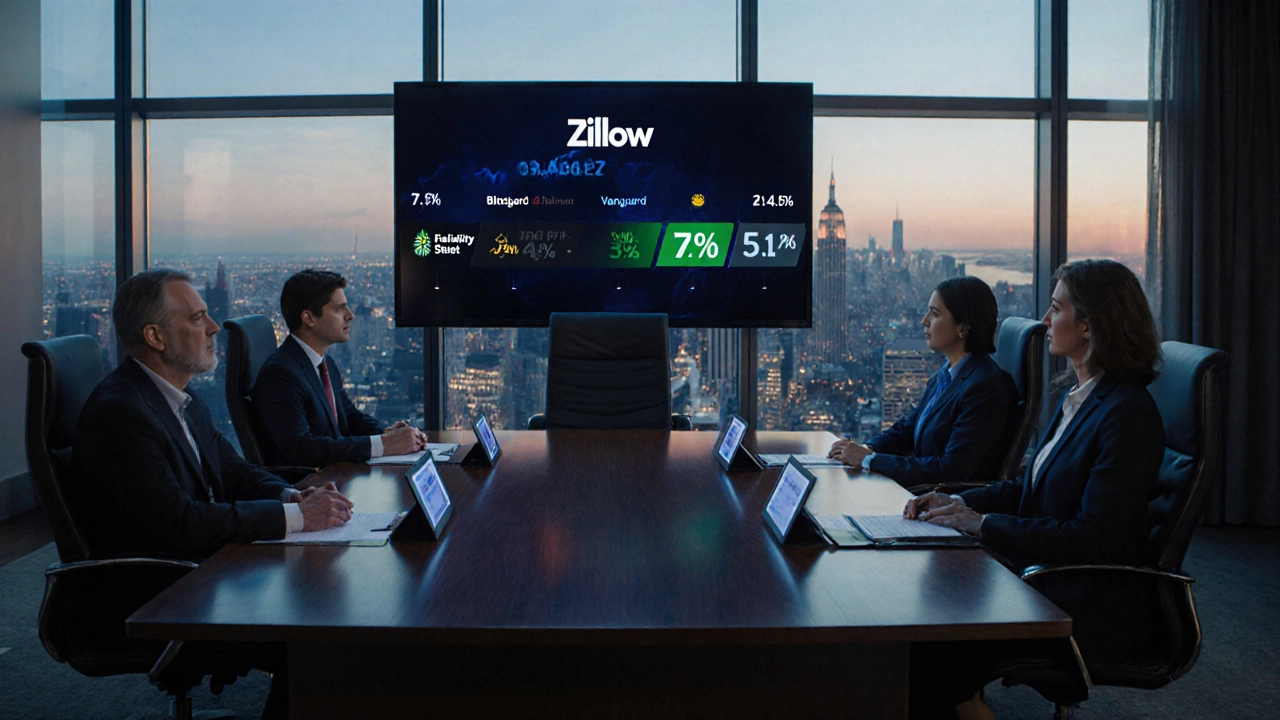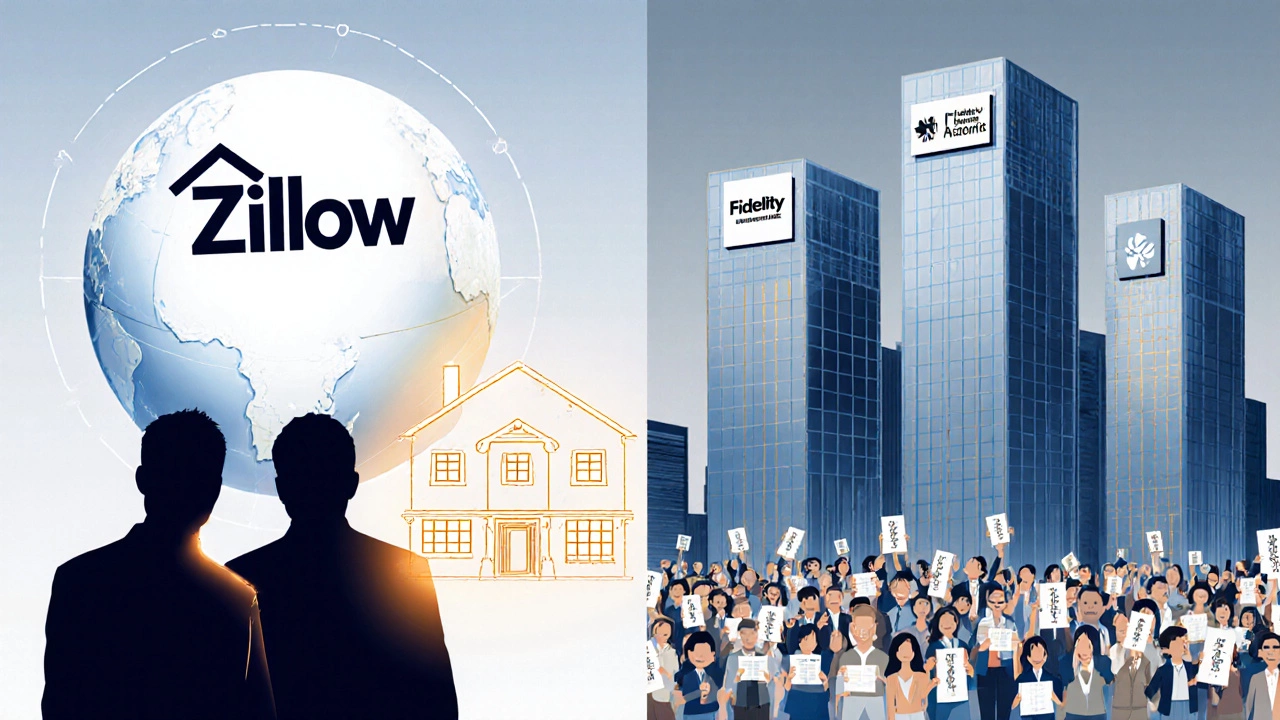Zillow Ownership Calculator
Ownership Context
Based on the latest data:
Your investment percentage will be calculated based on Zillow's current share count and price.
Key Takeaways
- Zillow ownership is split between public shareholders, institutional investors, and company insiders.
- Founders Rich Barton and Lloyd Frink together hold just under 10% of the total shares.
- BlackRock and Vanguard are the two biggest institutional owners, each with roughly 7% of the stock.
- Ownership concentration influences strategic moves like Zillow Offers and Zillow Home Loans.
- Understanding who controls Zillow can help buyers gauge the platform’s stability and long‑term direction.
What Is Zillow and Why Its Ownership Matters
When you browse listings on Zillow is a US‑based online real‑estate marketplace that lets users search homes for sale, rent, or refinance. It also offers tools for estimating home values, known as the “Zestimate,” and provides a suite of services for sellers, buyers, and renters.
Because Zillow powers millions of property searches each month, the people who own the company indirectly shape how the platform evolves. Shareholder pressure can drive new product launches, affect pricing for advertising, and even impact data privacy policies. That’s why many home‑buyers and investors ask, “Who owns Zillow?” - the answer reveals the balance of power behind the scenes.
The Corporate Structure: Zillow Group Inc.
Behind the consumer‑facing brand sits Zillow Group Inc. is the publicly traded parent company (NASDAQ: Z) that consolidates all of Zillow’s business lines, from the home‑search portal to Zillow Offers and Zillow Home Loans. The corporation files annual reports (Form 10‑K) that disclose every major shareholder, giving a transparent view of who controls voting power.
Since its IPO in 2011, Zillow Group has grown from a simple listings site to a full‑stack real‑estate platform. That growth has attracted a wide range of investors, from venture‑backed early employees to large‑scale asset managers that see Zillow as a proxy for the U.S. housing market.

Inside the Founders: Rich Barton and Lloyd Frink
The company’s DNA traces back to Rich Barton is a serial entrepreneur who previously co‑founded Expedia and later served as CEO of Zillow until 2023. Barton’s vision of “making real estate data open and accessible” set the tone for the brand’s user‑first philosophy.
Alongside him, Lloyd Frink is a technologist who helped build Zillow’s early engineering team and served as chief product officer for many years. Together, they own roughly 4.5% each of the total outstanding shares, giving them a combined influence of just under 10%.
While their stakes are modest compared with institutional investors, Barton and Frink retain board seats and can steer strategic discussions, especially around product innovation and market expansion.
Major Institutional Shareholders
Institutional money dominates Zillow’s cap table. Below is a snapshot of the top shareholders as of the latest proxy statement (early 2025). Percentages reflect voting shares, not necessarily the economic stake.
| Shareholder | Stake % | Type |
|---|---|---|
| BlackRock Inc. | 7.2 | Institutional |
| Vanguard Group Inc. | 6.9 | Institutional |
| Fidelity Investments | 5.4 | Institutional |
| State Street Corporation | 4.8 | Institutional |
| Rich Barton | 4.5 | Insider |
| Lloyd Frink | 4.3 | Insider |
| Sequoia Capital | 3.1 | Venture |
| Other public shareholders | 63.8 | Retail |
The dominance of BlackRock and Vanguard reflects a broader trend: large asset managers see Zillow as a bellwether for housing‑related consumer behavior. Their voting power can influence executive compensation, board composition, and major strategic pivots such as the recent shift away from the now‑defunct Zillow Offers program.

How Ownership Shapes the Platform and Its Users
Stakeholder composition matters because each group brings different priorities.
- Institutional investors focus on return on equity, profit margins, and predictable cash flow. This often translates into pressure to monetize services like advertising, premium listings, and mortgage lead generation.
- Founders and insiders tend to champion product innovation and long‑term brand equity. Barton’s push for robust data tools (e.g., the Zestimate algorithm) is a direct result of insider influence.
- Retail shareholders-the everyday investors who buy Z shares on the open market-support market‑driven decisions but have limited sway over day‑to‑day operations.
When a new revenue stream is proposed, such as a subscription model for agents, the board weighs both the growth potential and the risk of alienating users. Institutional shareholders may balk if the initiative threatens short‑term earnings, while founders might argue it’s essential for sustainability.
Recent Changes and What to Expect Next
In 2024, Zillow announced the wind‑down of its iBuying arm, Zillow Offers, after a costly retreat from the market. The decision was largely attributed to shareholder pressure to cut losses and refocus on core advertising and loan‑originating businesses.
Looking ahead, two trends could reshape ownership dynamics:
- Potential spin‑offs: Analysts speculate that Zillow may separate its mortgage division into a publicly traded entity. If that happens, institutional owners might reallocate shares, shifting the balance of power.
- ESG considerations: Large funds like BlackRock are increasingly evaluating environmental and social impacts. Zillow’s commitment to affordable housing data could become a factor in future voting decisions.
For home‑buyers, these shifts don’t directly affect the ability to search listings, but they can influence the speed of new features, the level of customer support, and the stability of the platform’s pricing model.
Frequently Asked Questions
Who are the biggest owners of Zillow?
The two largest shareholders are BlackRock (about 7.2% of voting shares) and Vanguard (about 6.9%). Together they control roughly 14% of the company.
Do Zillow’s founders still own a significant portion?
Rich Barton and Lloyd Frink each hold just under 5% of the total shares, giving them combined influence close to 10%.
Why does ownership matter to a home‑buyer?
Ownership affects strategic choices-like whether Zillow invests in new search tools, changes ad pricing, or expands loan services. Those choices shape the user experience you get on the site.
Can I buy Zillow stock directly?
Yes. Zillow Group Inc. trades on the NASDAQ under the ticker “Z.” You’ll need a brokerage account to purchase shares.
Has Zillow ever been taken private?
No. Since its IPO in 2011, Zillow has remained a public company, though it has explored strategic partnerships and acquisitions.
What are the risks of owning Zillow shares?
The main risks stem from the volatility of the U.S. housing market, regulatory changes affecting online real‑estate data, and the performance of Zillow’s non‑core businesses like mortgage lending.
Understanding who controls Zillow equips you with a clearer picture of the platform’s future direction. Whether you’re browsing listings, considering a mortgage, or thinking about investing, the answer to “Who owns Zillow?” matters more than you might think.

